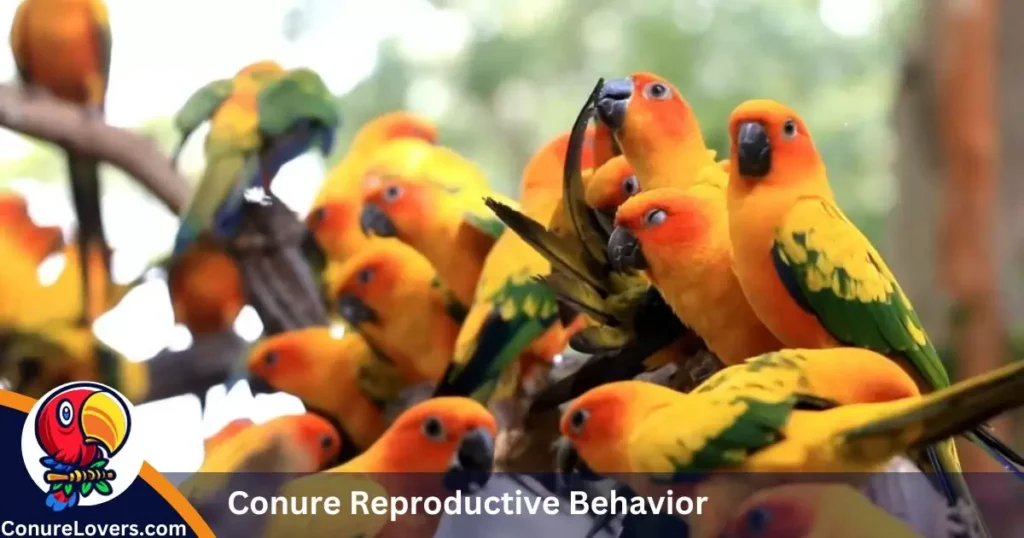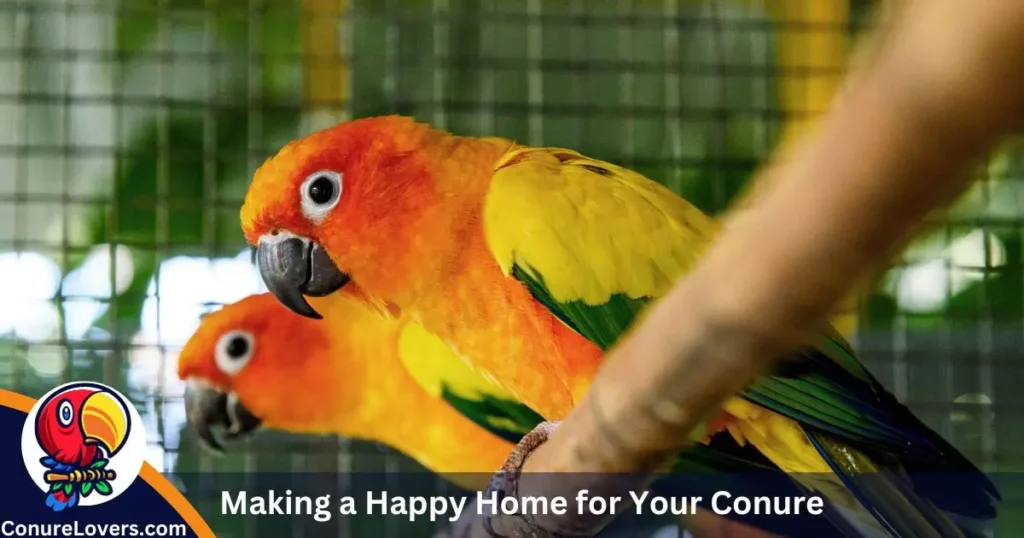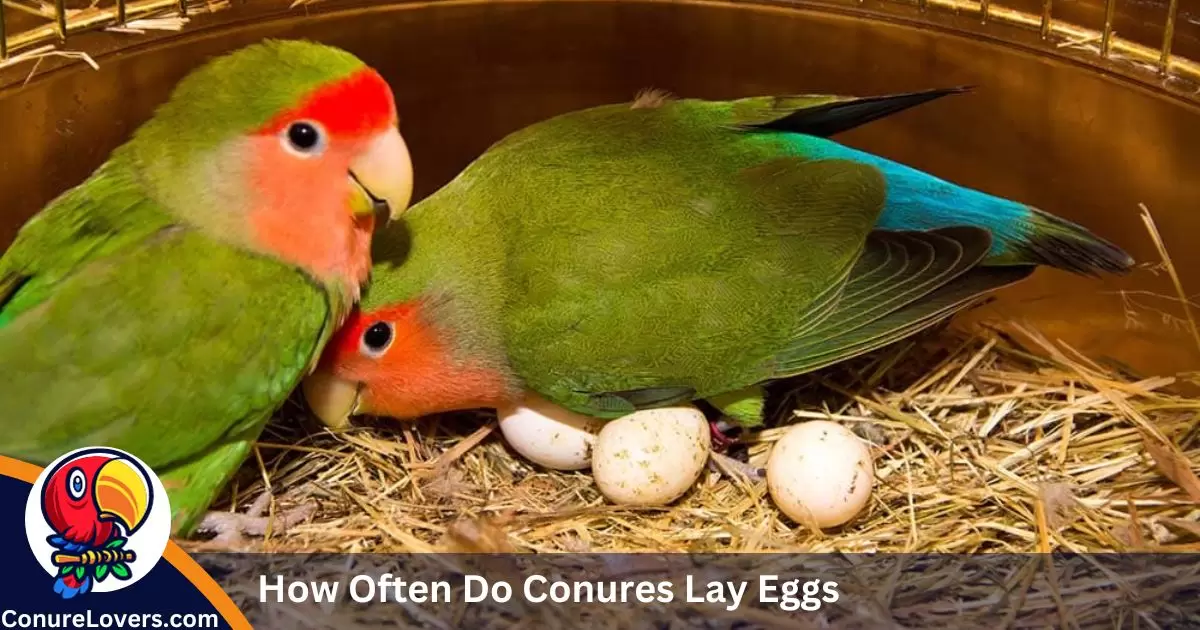When conures lay eggs, they usually lay 3 to 5 eggs at a time. It takes about 22 to 26 days for these eggs to hatch. The conures lay one egg every day until they have laid all the eggs in their clutch.
Conures lay eggs regularly, every other day, until they have a group of 4 to 9 eggs, which is called a clutch. If you take away the eggs, the bird will keep laying more eggs, which can be hard on her body. To help her, it’s best to leave the eggs in her cage for at least a month to slow down her egg-laying.
Ever wondered what our colorful feathery friends, conures, are up to in their cozy nests? Well, buckle up because we’re about to take a fun flight into the world of conures and their egg-citing habits! Today, we’re tackling the question, “How often do conures lay eggs?” Imagine this journey as a cool bird detective mission where we’ll uncover secrets about our chirpy companions.
From fluffing up nests to understanding when they might lay eggs, we’re about to become bird detectives together. So, get ready for a feather-filled adventure as we explore the egg-centric side of conure life!
Meet Our Reader – Bird Enthusiast Emma
Now, let’s meet someone just like you, a bird enthusiast named Emma. Picture Emma as your friendly neighbor who loves birds as much as you do. She’s not a bird expert, but she’s got a heart full of love for our feathered pals.
Emma is around 25 to 35 years old and works as a graphic designer. What’s cool about her is that, despite her busy schedule, she’s made time for a delightful conure companion, adding a splash of color to her city apartment.
Emma is on a mission to be the best bird parent she can be, and that’s where her questions come in. She’s noticed some interesting things about her conure and wonders, “How often do these little buddies lay eggs?” Emma is not alone in this curiosity; many bird lovers like her are exploring the ins and outs of conure behaviors. They want to create a home where their feathery friends can be happy and healthy.
So, if you find yourself nodding along with Emma’s bird-loving journey, you’re in good company! We’re about to explore the mysteries of conure egg-laying together. Whether you’re a bird owner or just love learning about our avian pals, join us as we unravel the secrets of conure life.
Get ready to have some fun and maybe even become a mini bird expert in the process! Emma is counting on us to help her create the perfect home for her conure, and you’re invited to join this exciting bird watching expedition!
Understanding Conure Reproductive Behavior

Alright, young bird enthusiasts, let’s spread our wings and dive into the interesting world of conure reproductive behavior. Now, when we say “reproductive behavior,” we’re talking about everything related to how conures handle family matters, like laying eggs and building nests.
Picture this: Conures, being the fantastic creatures they are, have unique ways of showing they’re ready for some family business. It’s like a special dance they do in the bird world! So, how often do they put on their dancing shoes, you ask? Well, it varies, and we’re here to break it down.
Conures are quite clever. They don’t just lay eggs randomly. Oh no! They pay attention to things like the seasons and the amount of sunlight they get. It’s like they have a built-in bird calendar. So, when the conditions are just right, our feathery friends might start thinking about creating a cozy nest for their eggs.
But hold on, we’re not done yet! Understanding conure reproductive behavior is like solving a cool bird puzzle. There are signs to watch out for. Imagine your conure acting a bit differently – maybe becoming extra playful or showing special attention to a particular spot in their cage. These might be hints that an egg-laying adventure is on the horizon.
Now, it’s important to know that not all conures will follow the same script. Each bird has its own unique way of doing things. So, if your feathered friend decides to do a little dance, don’t worry. It’s just their way of telling you, “Hey, something exciting might be happening soon!”
As we continue our bird detective mission, remember that understanding conure reproductive behavior is like decoding a secret bird language. Stay tuned, young bird detectives, as we explore the world of egg-laying and unveil the mysteries behind our chirpy companions’ family planning. Get ready for more bird-tastic discoveries in the next part of our feathery adventure!
Read More: Can Conures Eat Pineapple
How Often Do Conures Lay Eggs?
Welcome back, little bird detectives! Now that we’ve cracked the code on conure reproductive behavior, it’s time to answer the big question: “How often do these feathered buddies lay eggs?” Imagine it as getting the inside scoop on their birdie calendar.
Conures, being nature’s little artists, don’t lay eggs every day like clockwork. They have their own rhythm, and it’s influenced by a mix of factors. Think of it like a birdie concert where the melody is played by the changing seasons and the amount of daylight they get.
So, here’s the lowdown: Conures typically lay eggs when they feel the time is just right. Some might do it once a year, while others might plan a little family expansion more frequently. It’s all part of their natural instincts and the way they adapt to their surroundings.
But hey, don’t stress if you’re still wrapping your head around this birdie schedule. Emma, our bird enthusiast friend, felt the same way. That’s why we’re here – to make understanding your conure’s egg-laying routine as easy as a bird taking flight.
Now, here comes a cool part: not all conures lay eggs, and that’s perfectly okay! Some conures might decide that parenthood isn’t their thing, and that’s totally fine in the bird world. So, if your feathered friend decides to be a solo act, give them a round of applause for doing their own thing.
Here’s the takeaway, little bird detectives: How often conures lay eggs is like a birdie mystery novel. Each bird has its own unique story, and it’s up to us to pay attention to the clues. So, if you find yourself wondering when the next egg-laying adventure will happen, just remember – conures have their own groove, and it’s a dance worth watching.
Stay tuned for more birdie insights as our feathery journey continues. Next up, we’ll be decoding the signs of normal versus concerning behavior in our colorful companions. Get ready for more bird-tastic discoveries, and keep those binoculars ready for the next part of our chirpy adventure!
Signs of Normal vs. Concerning Behavior
Hello again, junior bird detectives! Now that we’ve uncovered the secrets of conure egg-laying frequency, it’s time to put on our detective hats and explore the signs that our feathery friends are giving us. Picture this section as a cool birdie investigation where we learn to read the messages our conures are sending us.
First off, let’s talk about the signs of normal behavior. When your conure is gearing up for an egg-laying adventure, you might notice some interesting behaviors. It’s like they’re giving us a sneak peek into their birdie plans. Keep an eye out for increased playfulness, extra fluffing of feathers, and maybe even a bit of rearranging in their cage – it’s like they’re decorating for a special occasion!
Now, on to the detective work: what if something seems a bit off? If your conure starts acting differently, like being unusually quiet, fluffing up for extended periods, or seeming lethargic, these might be signals that something’s amiss. It’s like our conures are sending us a birdie SOS.
Here’s the key, little bird detectives: normal behavior is like a happy song, while concerning behavior is more like a quiet tune that tells us something might be up. If you ever spot these signs, don’t worry – it’s our cue to be extra caring bird parents. Emma, our bird enthusiast, had these moments too, and she learned that paying attention to her conure’s signals helped her be the best bird buddy possible.
But wait, there’s more to this feathered tale! Sometimes, our conures might lay eggs without any warning signs. It’s like they’re playing a surprise egg-laying game. So, if you ever find a surprise egg in the cage, it’s okay. Just celebrate the unexpected addition to your birdie family!
Our mission, young bird detectives, is to be alert to the clues our conures give us. Understanding their language helps us create a happy and healthy home for our feathered friends. Stay tuned for the next part of our birdie adventure, where we’ll talk about creating a conure-friendly environment. Get ready to make your conure’s home the coziest nest in town!
Making a Happy Home for Your Conure

Hello again, young bird enthusiasts! Now, let’s chat about creating the best home sweet home for your feathery friend, your conure. Imagine this part like decorating a cool treehouse but for birds!
First off, let’s talk about space. Conures might be little, but they love having room to hop around. Picture your conure doing a little dance in a spacious cage—it’s like their own birdie playground! So, make sure their home is big enough for them to flap their wings and have a mini bird party.
Now, onto the fun stuff – decorations! Conures are like fancy decorators, and they enjoy having toys and perches to play on. Think of it as giving them a colorful, feathery amusement park. Toss in some fun toys, swings, and perches to keep them entertained. It’s like planning a birdie party every day!
Cozy time! Conures love feeling snug as a bug in a rug. Picture their cage like a cozy nest. You can add soft things like paper or cloth for them to snuggle into. It’s like giving them a warm, fluffy hug!
And here’s a cool tip: Conures are sun seekers. They love a bit of sunlight, like a spotlight for their bright feathers. Try placing their cage in a spot with some sunlight during the day. Just make sure it’s not too sunny – we want happy birds, not sunbaked ones!
Our bird enthusiast friend, Emma, found out that making a cozy home isn’t just about stuff. It’s also about the vibe. Conures like a chill atmosphere, so keep the noise level down, and avoid sudden loud sounds. Imagine it like setting up a bird spa!
Remember, a balanced diet is a big deal. Think of it as serving your conure a tasty buffet of fresh fruits, veggies, and good bird food. It’s like giving them a gourmet feast every day!
So, little bird architects, when you set up your conure’s place, think about space, decorations, coziness, sunlight, and yummy food. Your conure will be as happy as a bird in a birdie paradise! Stay tuned for more birdie fun in the next part, where we’ll explore the cozy world of conure nests. Get ready for some nest-building adventures!
Conclusion:
We’ve had a blast discovering the cool world of conures together. Being a bird detective is all about watching, learning, and making a comfy home for our feathery pals.
Whether your conure is a nest-making champ or just likes things simple, understanding their birdie ways makes you an awesome bird caretaker. Follow Emma’s lead, our bird-loving friend, and enjoy the happiness of seeing your conure happy in their cozy spot.
So, keep those pretend binoculars close, stay curious, and keep having fun with your birdie buddies. The bird world is huge, and there’s always more to find out. Happy bird watching, and may your days be filled with lots of feathery fun!

It’s Ethan Richards, your Feathered Pal Expert from “Conure Lovers.” Let’s embark on a delightful adventure of conure companionship. I’ll share practical tips to ensure your feathered buddy lives a happy and healthy life.












